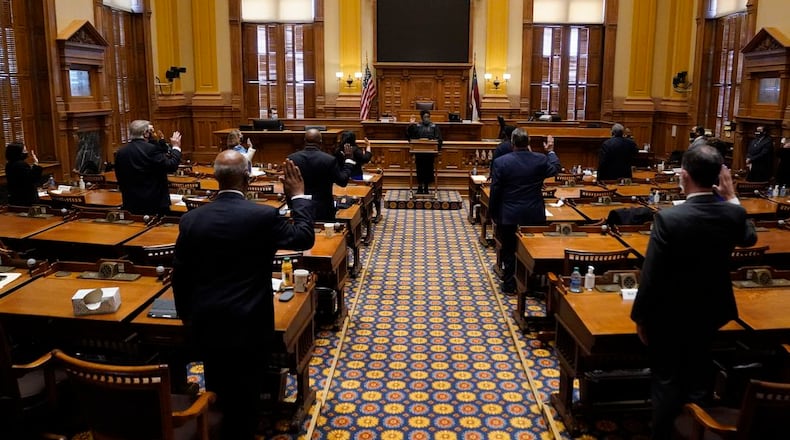At least eight of the Georgia Republicans who served as “alternate” presidential electors in 2020 have accepted immunity deals with the Fulton County District Attorney’s office in exchange for their testimony, according to the lawyer representing the group.
The disclosure came in a Friday afternoon court filing from Kimberly Bourroughs Debrow, an attorney prosecutors are seeking to remove from the case due, in part, to her unusual joint representation arrangement.
In a fiery 68-page response, the Newnan-based Debrow vehemently defended her actions. She accused special prosecutor Nathan Wade, who is heading up the DA’s criminal investigation of alleged meddling in Georgia’s latest presidential election, with misleading and intimidating her clients during recorded interviews last month after they accepted the immunity deals. Debrow did not disclose which of the electors had agreements in place.
In one case, Debrow wrote, “Mr. Wade made outrageous threats and engaged in intimidation tactics in front of the elector being interviewed when Mr. Wade believed the recording had stopped, threatening to revoke their immunity and indict them (which he has no authority to do), all to try to silence defense counsel and prevent the truth from coming out.”
A spokesman for Fulton DA Fani Willis declined to comment.
Prosecutors have indicated they’re interested in the documents the GOP activists submitted to the National Archives following a ceremony in the state Capitol on Dec. 14, 2020, in which they claimed to be Georgia’s duly elected presidential electors.
They’ve also focused their investigation on calls former President Donald Trump and his allies placed to Georgia officials, alleged attempts to intimidate a Fulton County poll worker and efforts to spread misinformation about Georgia’s vote count, among other events between Nov. 2020 and Jan. 2021.
All 16 Republican electors were sent letters from the Fulton DA’s office last summer alerting them that they were investigation “targets” and could see criminal charges as a result. Willis and her office were later barred from pursuing charges against one of those electors, Lt. Gov. Burt Jones, due to a political conflict of interest.
Legal experts are divided on the legal exposure of the GOP electors. Some argue they could be charged with violating state laws against false statements, forgery, racketeering and election fraud. Others contend that the intent of the electors will be a key factor in determining any criminality — and could be difficult to prove.
David Shafer, the outgoing chairman of the Georgia Republican Party who served as an elector, has long maintained the group did nothing wrong and was following the advice of legal counsel to “preserve” Trump’s rights as the then-president fought Georgia’s vote count in court. He and others have cited as precedent the alternate slate of Democratic electors produced in Hawaii during the 1960 elections.
Debrow at one point represented 11 of the GOP electors alongside attorney Holly Pierson. (Among them were newly elected state Sen. Shawn Still, state GOP treasurer Joseph Brannan, assistant treasurer Vikki Consiglio and Atlanta lawyer Brad Carver.)
In November, Fulton Superior Court Judge Robert McBurney directed Pierson and Debrow to choose between representing elector Shafer and the 10 other electors following a challenge from the DA’s office. Pierson opted to retain Shafer, while Debrow remained with the 10 other electors.
In Friday’s filing, Debrow confirmed that she was currently only representing eight electors. The two other clients, she said, had hired outside counsel since they were not offered immunity deals.
Among Debrow’s clients who appeared to have found new legal representation: former Coffee County GOP Chairwoman Cathy Latham. The former school teacher joined an effort from former President Donald Trump to disqualify the DA’s office from its investigation and quash evidence generated by a special grand jury. Latham’s filing, which suggested she did not have an immunity deal in place, was signed by a new lawyer.
Debrow’s filing came in response to an effort from Willis to disqualify Debrow from representing so many investigation players, which prosecutors said had become an “impracticable and ethical mess.” Prosecutors also raised a damning allegation: that Debrow and Pierson had failed to inform their clients about the potential immunity deals after they were offered last summer.
Debrow had previously called prosecutors’ claims “baseless, false, and offensive,” and in Friday’s filing she laid out in great detail her communications with her clients, McBurney and the DA’s office. She provided signed statements that her clients had previously submitted to the Superior Court confirming Debrow’s account about when they were informed about immunity — and potential immunity — deals.
Prosecutors’ “allegations about the immunity issue are plainly false, and their own interview recordings prove that fact,” Debrow wrote. “The District Attorney has falsely but publicly maligned the integrity of two well-respected and fellow members of the Bar based on fictional claims known to be untrue when made. Such reckless and unprofessional conduct is simply untenable and unacceptable.”
Debrow also countered an allegation from the DA’s office that some of her clients had recently accused a fellow elector of committing “acts that are violations of Georgia law.” Debrow said she had sat in on and recorded all of her clients’ interviews and that no one said anything incriminating of themselves or one another. Not only that, but since they had immunity deals in place they couldn’t incriminate on another, she added.
All of her clients, she said, “remain united in their innocence.”
Both Debrow and Pierson’s legal fees are being paid for, at least in part, by the state Republican Party. So far, the Georgia GOP has spent at least $317,000 on lawyers representing the electors, public filings show.
About the Author
Keep Reading
The Latest
Featured



